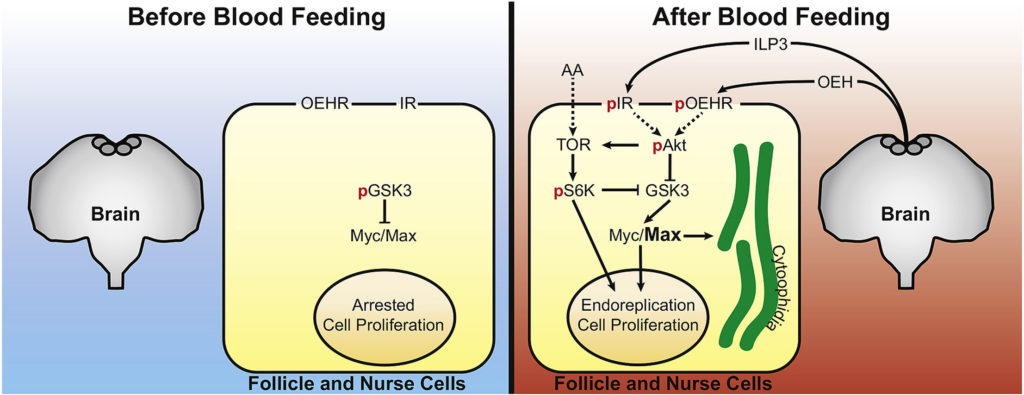Blood feeding activates the vitellogenic stage of oogenesis in the mosquito Aedes aegypti through inhibition of glycogen synthase kinase 3 by the insulin and TOR pathways
 Most mosquitoes, including Aedes aegypti, only produce eggs after blood feeding on a vertebrate host. Oogenesis in A. aegypti consists of a pre-vitellogenic stage before blood feeding and a vitellogenic stage after blood feeding. Primary egg chambers remain developmentally arrested during the pre-vitellogenic stage but complete oogenesis to form mature eggs during the vitellogenic stage. In contrast, the signaling factors that maintain primary egg chambers in pre-vitellogenic arrest or that activate vitellogenic growth are largely unclear. Prior studies showed that A. aegypti females release insulin-like peptide 3 (ILP3) and ovary ecdysteroidogenic hormone (OEH) from brain neurosecretory cells after blood feeding. Here, we report that primary egg chambers exit pre-vitellogenic arrest by 8 h post-blood meal as evidenced by proliferation of follicle cells, endoreplication of nurse cells, and formation of cytoophidia. Ex vivo assays showed that ILP3 and OEH stimulate primary egg chambers to exit pre-vitellogenic arrest in the presence of nutrients but not in their absence. Characterization of associated pathways indicated that activation of insulin/insulin growth factor signaling (IIS) by ILP3 or OEH inactivated glycogen synthase kinase 3 (GSK3) via phosphorylation by phosphorylated Akt. GSK3 inactivation correlated with accumulation of the basic helix-loop-helix transcription factor Max and primary egg chambers exiting pre-vitellogenic arrest. Direct inhibition of GSK3 by CHIR-99021 also stimulated Myc/Max accumulation and primary egg chambers exiting pre-vitellogenic arrest. Collectively, our results identify GSK3 as a key factor in regulating the pre- and vitellogenic stages of oogenesis in A. aegypti.
Most mosquitoes, including Aedes aegypti, only produce eggs after blood feeding on a vertebrate host. Oogenesis in A. aegypti consists of a pre-vitellogenic stage before blood feeding and a vitellogenic stage after blood feeding. Primary egg chambers remain developmentally arrested during the pre-vitellogenic stage but complete oogenesis to form mature eggs during the vitellogenic stage. In contrast, the signaling factors that maintain primary egg chambers in pre-vitellogenic arrest or that activate vitellogenic growth are largely unclear. Prior studies showed that A. aegypti females release insulin-like peptide 3 (ILP3) and ovary ecdysteroidogenic hormone (OEH) from brain neurosecretory cells after blood feeding. Here, we report that primary egg chambers exit pre-vitellogenic arrest by 8 h post-blood meal as evidenced by proliferation of follicle cells, endoreplication of nurse cells, and formation of cytoophidia. Ex vivo assays showed that ILP3 and OEH stimulate primary egg chambers to exit pre-vitellogenic arrest in the presence of nutrients but not in their absence. Characterization of associated pathways indicated that activation of insulin/insulin growth factor signaling (IIS) by ILP3 or OEH inactivated glycogen synthase kinase 3 (GSK3) via phosphorylation by phosphorylated Akt. GSK3 inactivation correlated with accumulation of the basic helix-loop-helix transcription factor Max and primary egg chambers exiting pre-vitellogenic arrest. Direct inhibition of GSK3 by CHIR-99021 also stimulated Myc/Max accumulation and primary egg chambers exiting pre-vitellogenic arrest. Collectively, our results identify GSK3 as a key factor in regulating the pre- and vitellogenic stages of oogenesis in A. aegypti.
Luca Valzania, Melissa T. Mattee, Michael R. Strand, Mark R. Brown. 2019. Dev Biol.; pii: S0012-1606(19)30272-6. doi: 10.1016/j.ydbio.2019.05.011
